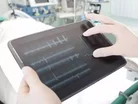5 Things You Need to Know About Electronic Health Records

Can electronic health record (EHR) integration improve residents of nursing homes’ health outcomes, reduce avoidable hospitalizations and medication errors? Can EHRs also reduce system inefficiencies resulting in cost savings?
According to the Leading Age CAST Report, these are the top five findings that can help answer those questions.
1. EHRs are a key driver to high quality health care.
With accurate data, reporting and clinical decision support tools, these capabilities are essential to improving care quality, driving efficiencies, reducing hospital readmissions and strengthening partnerships with other care providers.
[READ MORE] TOP 10: EHRs According to Physicians
2. Communication is essential for successful implementation.
It is important to develop strong working relationships and shared communication between clinical and technology team members. Input from both sides ensures success in the launch of the EHR.
3. EHR information exchange is the trend of the future.
The movement to have electronic health information in an electronic format, readily available for other health care providers is the trend of the future. The care of a patient is no longer an isolated occurrence by each provider, but rather a continuum of care.
[READ MORE] Electronic Health Records Promise a Better Future for the Health Care Industry
4. Health information exchange improves patient safety.
Patient information provided by clinicians during resident transfer can improve the quality of care and therefore a patient’s safety. Automated clinical and decision support tools can improve the quality and safety components of managing and coordinating care for older, disabled patients with complex medical conditions.
5. Providers should address challenges to health information exchange.
Varying degrees of technology adoptions, compliance standards, interoperability capacity and standards are all components that pose challenges to the fluid implementation of fully informed transitions of care between hospitals and long term and post acute settings.
Follow us on Twitter (@HealthcareGlbl) and like us on Facebook!



